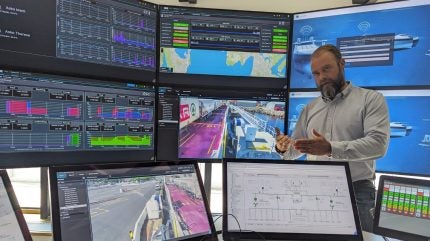
Kongsberg Maritime has said it received Approval in Principle from classification society DNV and the Norwegian Maritime Authority to transfer the role of chief engineer from ship to a shore-based control centre as it develops uncrewed vessels.
The approval marked a significant step in Kongsberg’s push for autonomous shipping, which has been met with resistance on grounds of safety, regulation and job losses.
An-Magritt Ryste, Kongsberg Maritime Director Next Generation Shipping, said the “conservative” shipping industry was the overriding factor in these delays, but added that Kongsberg was “not going to put it all on the regulators”.
The shipping giant, which is majority-owned by the Norwegian government, said it expects full approval to be granted later this year for its so-called ‘chief-to-shore’ functionality.
At Kongsberg Maritime’s Remote Operations Centre in Horton, just outside of Oslo, Ryste told Ship Technology the firm’s autonomous system is now a “working reality” which had entered the “testing period”.
Ryste added that Kongsberg is still ironing out regulation, standardisation and legal terminology with the DNV, International Maritime Organisation (IMO) and Norwegian Maritime Authority, which will oversee various tests over the next few months.
How well do you really know your competitors?
Access the most comprehensive Company Profiles on the market, powered by GlobalData. Save hours of research. Gain competitive edge.

Thank you!
Your download email will arrive shortly
Not ready to buy yet? Download a free sample
We are confident about the unique quality of our Company Profiles. However, we want you to make the most beneficial decision for your business, so we offer a free sample that you can download by submitting the below form
By GlobalDataA shore-based technician will manage various tasks on three vessels, simultaneously, from the operations centre, should an issue arise which requires intervention.
“Remote machinery support is a first natural step on the path to autonomy as the engineering functions onboard a vessel are in many ways already automated,” said Jarle Coll Blomhoff, DNV’s Head of Section Digital Ship Systems.
“We believe this is a key step for Kongsberg Maritime’s pathway to fully autonomous vessels, but also a technology that could contribute to a safer and more efficient world fleet by providing remote support for maintenance, troubleshooting as well as expertise on new alternative fuels that may be hard to get onboard every vessel.”
Same old story?
Unmanned vessels have been discussed at length since 2018, when Kongsberg and other shipping companies set the goal of remote operation by 2019 – and fully autonomous operations by 2020. Five years on, concerns around ship safety persist.
In the last year and a half, the number of crew aboard ASKO, one of Kongsberg’s three anonymous vessels, has decreased from six to three, a Kongsberg engineer told Ship Technology. This will decrease to an on-board crew of just two once full approval for chief-to-shore is granted.
Unmanned vessels also reduce the number of collateral jobs, such as an on-board chef or cleaner.
“We have trouble with getting access to qualified seafarers, that is a bigger issue for many states in the world”, Ryste told Ship Technology. “Relocating on-board jobs to land is a different environment and key for attracting talent into maritime”.
Ryste added that the shortage of younger seafarers is another factor driving Kongsberg’s autonomous push.
The average seafarer age has risen dramatically, surpassing 60 years old in countries like Japan. Kongsberg staff said jobs which are based in an office rather than on a vessel are more attractive to younger generations.
Staff shortages also relate to the second aspect of Kongsberg’s two-pronged push into autonomous technology.
Aside from its three electric vessels, the Yara Birkeland container, Marit barge and Therese barge, Kongsberg also operates autonomous ferry crossings on the Flakk-Rørvik route. This involves self-docking on more than 20,000 fully automated crossings in total.
The Norwegian firm believes it is addressing a key issue in the industry, with roughly 1,500 ferry crossings cancelled in Norway last year allegedly because of crew shortages.
Kongsberg now hopes to convince customers, competitors, regulators, government and potential investors alike that the future of shipping lies in autonomous, uncrewed vessels.
“When the dust is settled, we’ll move on to the next row, which is navigator-to-shore – and then master-to-shore”, Ryste concluded. “Then we will have no people onboard, everything will be managed, supervised and monitored on land.”







